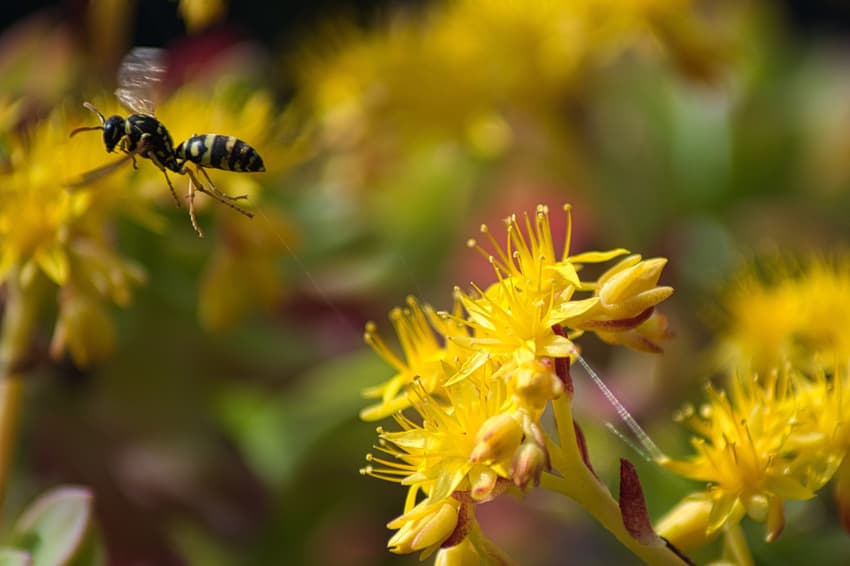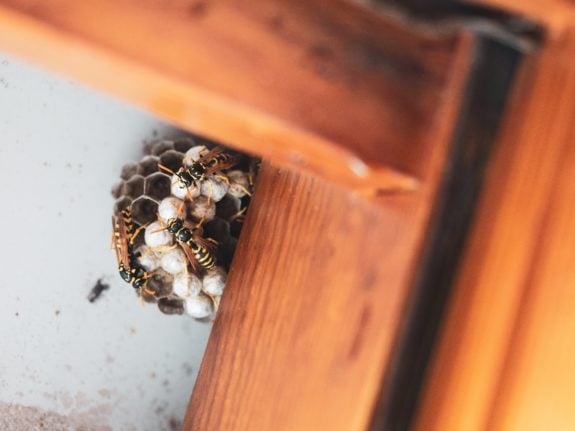How to avoid wasps this summer in Switzerland

Milder winters and springs mean we see more wasps in Switzerland this summer. Here is how to legally (and successfully) avoid them.
If you feel like you are never alone anymore – because there is always a pesky little wasp around – and the number of nests has grown significantly this summer, this might be the case.
As the planet gets hotter and winters and springs have milder temperatures, there are more wasps than usual buzzing around Europe this summer.
In France, pest control companies even call 2022 the “year of the wasp”, as The Local France reported.
More wasps are buzzing around - and they are angry
There is an abundance of wasps this summer even in Switzerland and they are not exceptionally good-natured right now, according to Daniel Cherix, a leading insect specialist at the University of Lausanne. The more wasps there are, the more in competition they are for food sources — which includes your outdoor barbecue food or bottle of soda.
The hot weather makes it easier for the wasps to work more hours feeding the larvae. However, the longer and harder they work, the more tired and hungrier they become.
READ ALSO: Why Switzerland is abuzz with ‘tired and angry’ wasps
This means that, just like their human counterparts, they need to rest and eat, making a beeline for the nearest food source.
“If there is no prey, they have to fly longer. So they will start to get tired and angry”, Cherix said, which doesn’t bode well for the nearest available human.
This situation is expected to worsen until the autumn; until then, the wasp colonies will continue to get bigger and presumably angrier and more tired.
How can I avoid wasps?
Even though the number of wasps is rising in Switzerland, only two of the nine local wasp species are attracted by human food. Additionally, they are all peaceful as long as you don't get too close to their nest, the Swiss Federal Office for the Environment says.
The government also states several measures that can be taken to avoid wasps. It reiterates, though, that if any of these animals are nearby, it is vital to "behave calmly and not to make hectic movements that could make the wasps feel threatened".

Some nests are harmless and shouldn't be disturbed. (Photo by Ante Hamersmit on Unsplash)
Wasps can be kept away by insect screens, covering food and drinks served outside, drinking sweet drinks with a straw when outdoors, and removing and cleaning dishes and food after eating out. The Environment office also recommends removing fallen fruits under fruit trees in the garden to avoid attracting was.
People can also spray individual wasps (but never nests!) with water to get them to fly away.
READ ALSO: Swiss study says bee-harming pesticides present in 75 percent of honey worldwide
To prevent nesting, it's important to close small openings in and around your house. Wasps like to nest in dark, shelter places, such as attics and any holes in the buildings. Recognising a nest early can help you prevent it from growing and adopt the proper measures - such as calling specialised assistance if necessary.
What to do if I find a wasp nest in my home?
There are specific rules of conduct to be followed if you find a wasp nest, especially since wasps will attack if they feel their nest threatened. Wasps stings are usually harmless unless you are allergic, but they can be painful.
A relocation could be necessary if the nest is near homes with children, allergic people or the elderly. If it is harmless or summer is close to ending, though, many specialists will advise you just to wait it out - wasps will die when it gets cold.
A specialised service needs to be hired if the nest needs to be relocated.
The last resort is to kill the nest using chemicals, but this needs to be done by specialists with federal approval to use such biocides. In some cantons, environmental protection rules forbid using chemicals without a proper license.
Comments
See Also
If you feel like you are never alone anymore – because there is always a pesky little wasp around – and the number of nests has grown significantly this summer, this might be the case.
As the planet gets hotter and winters and springs have milder temperatures, there are more wasps than usual buzzing around Europe this summer.
In France, pest control companies even call 2022 the “year of the wasp”, as The Local France reported.
More wasps are buzzing around - and they are angry
There is an abundance of wasps this summer even in Switzerland and they are not exceptionally good-natured right now, according to Daniel Cherix, a leading insect specialist at the University of Lausanne. The more wasps there are, the more in competition they are for food sources — which includes your outdoor barbecue food or bottle of soda.
The hot weather makes it easier for the wasps to work more hours feeding the larvae. However, the longer and harder they work, the more tired and hungrier they become.
READ ALSO: Why Switzerland is abuzz with ‘tired and angry’ wasps
This means that, just like their human counterparts, they need to rest and eat, making a beeline for the nearest food source.
“If there is no prey, they have to fly longer. So they will start to get tired and angry”, Cherix said, which doesn’t bode well for the nearest available human.
This situation is expected to worsen until the autumn; until then, the wasp colonies will continue to get bigger and presumably angrier and more tired.
How can I avoid wasps?
Even though the number of wasps is rising in Switzerland, only two of the nine local wasp species are attracted by human food. Additionally, they are all peaceful as long as you don't get too close to their nest, the Swiss Federal Office for the Environment says.
The government also states several measures that can be taken to avoid wasps. It reiterates, though, that if any of these animals are nearby, it is vital to "behave calmly and not to make hectic movements that could make the wasps feel threatened".

Wasps can be kept away by insect screens, covering food and drinks served outside, drinking sweet drinks with a straw when outdoors, and removing and cleaning dishes and food after eating out. The Environment office also recommends removing fallen fruits under fruit trees in the garden to avoid attracting was.
People can also spray individual wasps (but never nests!) with water to get them to fly away.
READ ALSO: Swiss study says bee-harming pesticides present in 75 percent of honey worldwide
To prevent nesting, it's important to close small openings in and around your house. Wasps like to nest in dark, shelter places, such as attics and any holes in the buildings. Recognising a nest early can help you prevent it from growing and adopt the proper measures - such as calling specialised assistance if necessary.
What to do if I find a wasp nest in my home?
There are specific rules of conduct to be followed if you find a wasp nest, especially since wasps will attack if they feel their nest threatened. Wasps stings are usually harmless unless you are allergic, but they can be painful.
A relocation could be necessary if the nest is near homes with children, allergic people or the elderly. If it is harmless or summer is close to ending, though, many specialists will advise you just to wait it out - wasps will die when it gets cold.
A specialised service needs to be hired if the nest needs to be relocated.
The last resort is to kill the nest using chemicals, but this needs to be done by specialists with federal approval to use such biocides. In some cantons, environmental protection rules forbid using chemicals without a proper license.
Join the conversation in our comments section below. Share your own views and experience and if you have a question or suggestion for our journalists then email us at [email protected].
Please keep comments civil, constructive and on topic – and make sure to read our terms of use before getting involved.
Please log in here to leave a comment.